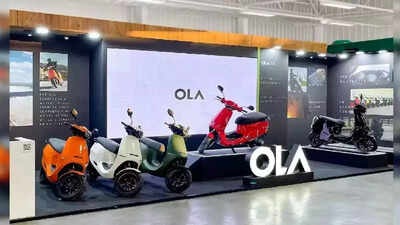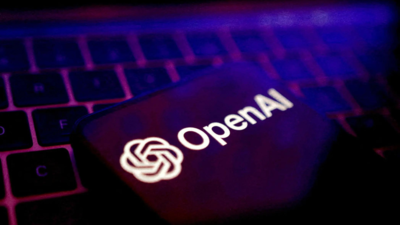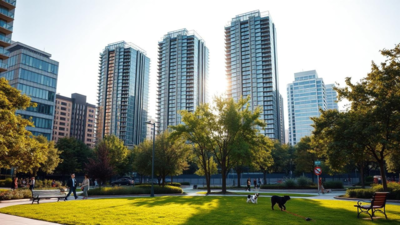Achieved a lot, there’s evidence things are on right track: AI CEO
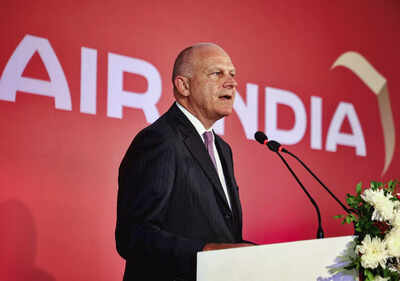
Tata Motors shed its “taxi” image after the acquisition of UK’s JLR when it started to churn out world class cars. Vistara’s merger into Air India could prove to be a similar moment for Air India as the Maharaja has crossed more than half way of the transition to become a much better airline that was promised when Tatas took over AI and AI Express in Jan 2022. In a freewheeling interview, AI MD & CEO Campbell Wilson discusses the airline’s revamp, the IndiGo wet lease controversy and regulatory challenges. Excerpts:Why has revamping of old planes, especially wide bodies, taken longer than anticipated?We are getting the ordered new planes, including Boeing 737 MAX for AI Express and will get a B787 & Airbus A350 for AI this fiscal. So, they are coming. But they are later than we had originally contracted to receive them for reasons Boeing and Airbus can tell you. Depending on the 6 to 12 months (delay), this is a little bit frustrating for all involved, including the original equipment manufacturer. But it’s an industry issue. The other thing that has caused challenge to the original timelines is the certification, production and installation of business class seats, in particular on the legacy aircraft. So, the refit programmes, which we had hoped to have largely completed by now on the wide body fleet, are still underway. Why does on time performance (OTP), again particularly for long hauls on wide bodies, remain a challenge?OTP of international flights on wide body fleets is improving significantly. It’s not where we want it to be. There are a few reasons for that. The aircraft were terribly neglected, not well maintained and have old components. They hadn’t kept paced with the advances in technology. All of that needed to be replaced and upgraded. It is taking time, particularly because of supply chain constraints. But technical despatch reliability of aircraft has gone materially up. Has it reached the global average? In some cases, yes. But in most cases, no, because there is still more work to do. There were several other issues, which are being taken care of, including AI not recruiting people for 20 years before privatisation. The staff not being exposed to contemporary best practices. People had been promoted because of tenure, not talent. That had needed to be changed. That takes time.
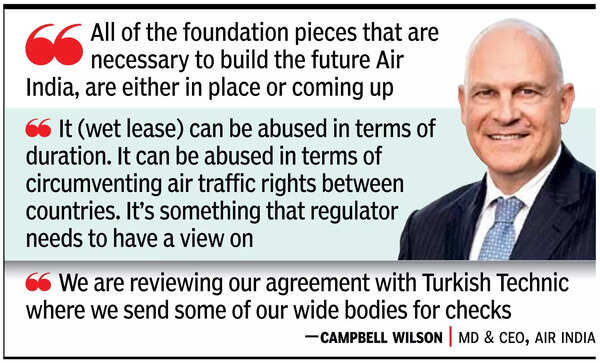
Are you satisfied with pace of change at AI Group?We’ve completed the merger of four airlines. We finished the year with an OTP that was higher than Vistara. The financial trajectory, particularly for the full service carrier, is going very well. New Air India is in service to New York and to London with the A350. Passengers are very pleasantly surprised on what we are delivering on that. . We have a training academy now seeing 2,000 people being trained and upgraded today. All of the foundation pieces that are necessary to build the future Air India, are either in place or coming up. We’ve achieved a lot and there’s clear evidence that things are on the right track.Are you having a relook at your tie-up with Turkish Technic, following the country’s role during Operation Sindoor?We are reviewing our agreement with Turkish Technic where we send some of our wide bodies for checks. It takes some time to adjust when the situation changes. But we are aware of the national sentiment and what people expect us to do. We will look to recalibrate where we send our aircraft. We are looking at options to send our planes for maintenance repair and overhaul.IndiGo is wet leasing planes to launch long hauls. What do you feel about wet lease policy?There’s a place for wet lease for short-term capacity augmentation. (However) it can be abused in terms of duration. It can be abused in terms of circumventing air traffic rights between countries. Ultimately, it’s something that regulator needs to have a view on.


